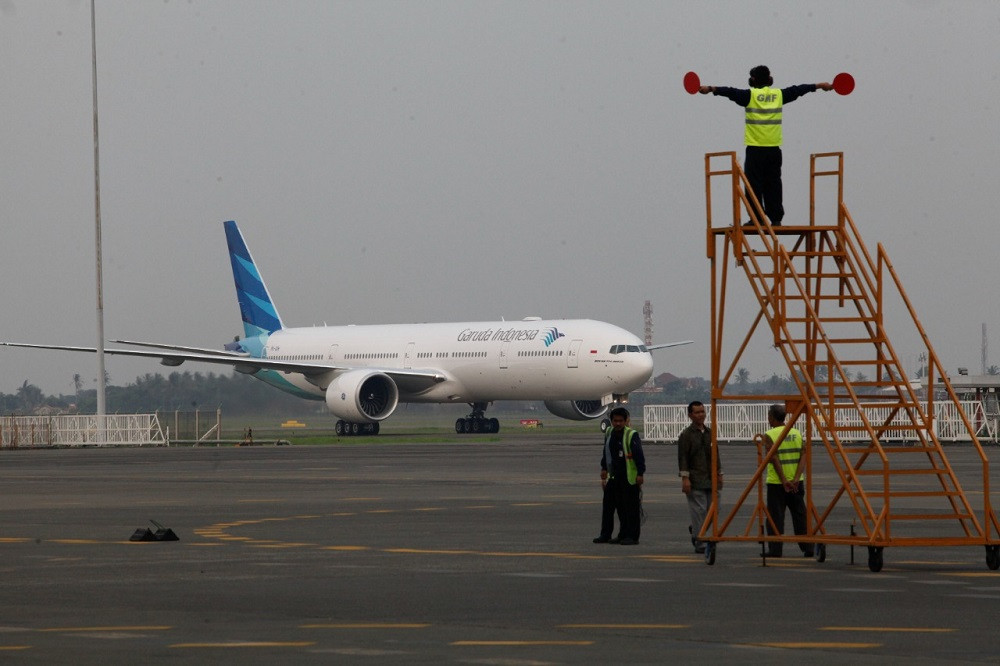Popular Reads
Top Results
Can't find what you're looking for?
View all search resultsPopular Reads
Top Results
Can't find what you're looking for?
View all search resultsFacing bankruptcy, Garuda weighs options
Garuda Indonesia is mulling over ways to extricate itself from a debt crisis, and one of the favored options involves creating a new national flag carrier.
Change text size
Gift Premium Articles
to Anyone
N
ational flag carrier Garuda Indonesia is leaning toward two options to extricate itself from a debt crisis without placing additional burden on government finances.
Garuda president director Irfan Setiaputra said the airline's board was considering four major options in negotiations with creditors but was learning to the second or third. The first option — a loan or capital injection from the government — was not preferred as it would weigh on the state budget.
The second option would involve a debt postponement petition (PKPU) to restructure Garuda’s liabilities, such as debt, owed lease and owed salaries. Should Garuda choose that path, it would have 270 days under the Bankruptcy Law to reach agreements with lenders and lessors. Failing to do so, Garuda would automatically be declared bankrupt.
The third would require the government to establish a new national flag carrier, while Garuda would be left to restructure its debt. The fourth option would be to liquidate Garuda without replacing it, rendering its market share to be taken over by private carriers.
“What are options two and three? Restructuring. It is impossible for the government to be the one bearing all these debts,” Irfan told lawmakers during a meeting at the House of Representatives on Tuesday to explain why the board disliked the first option.
On top of that, Garuda is keen on a fifth option but was hesitant to include it in its proposal to lenders, as that option would require approval from shareholders. It would see Garuda’s lenders convert their debt into equity, which means existing shareholders’ stakes would be diluted.
The government holds a stake of just over 60 percent in Garuda, and CT Corp holds a little more than 28 percent.
Read also: IDX suspends trading of Garuda Indonesia shares after airline defaults on sukuk
Garuda is devising its restructuring plan while its financial condition continues to worsen. The State-Owned Enterprises (SOEs) Ministry estimates the carrier’s debt at more than US$4.5 billion and monthly losses at more than $100 million.
Garuda’s third-quarter 2020 financial report showed $1.07 billion in net losses, a figure that was expected to grow to $2.5 billion for the full year.
On June 17, Garuda defaulted on coupon payments for a $500 million global sukuk after a 14-day grace period expired. Indonesia Stock Exchange has halted trading of the carrier's shares ever since.
Read also: Garuda’s recovery from debt crisis hinges on business restructuring
Garuda is reluctant to reveal more details about its plans and proposal. Garuda vice president director Dony Oskaria said the carrier was wary of sharing too many details.
“This will be put before Garuda's creditors, so we cannot explain it partially. There are already [certain parties] who are reluctant to join the restructuring process,” Dony said at the same meeting with Irfan.
“Our target is for the restructuring plan for Garuda to be completed within three weeks."
Jakarta-based aviation consultant Gerry Soejatman said the first option, government help, was far from realistic, given the financial pressure amid the economic downturn. Doing so would also be deemed unjust because Garuda is not the only one suffering from the pandemic.
Moreover, should the government go with the first option, there was no guarantee Garuda’s problems would be solved, he said, adding that restructuring was a must for Garuda to emerge from its debt crisis.
“If the government just continues to bail out Garuda without any restructuring in return, or without any changes to make [the company] more profitable, it would just be a waste of money,” Gerry told The Jakarta Post on Thursday.
Toto Pranoto, an SOE analyst from the University of Indonesia (UI), said the second option may be more suitable for Garuda, especially given that time was not on the government’s side.
He noted that the third option would require a lot of time just for setting up a new company in such a heavily regulated market as the airline industry. If Garuda ceased to exist and its routes were up for grabs, private carriers may show no interest in serving remote areas.
“In a state of urgency, there’s the option of protection under the Bankruptcy Law,” Toto told the Post on Thursday, stressing the need for the company to prepare a comprehensive plan so that the negotiations with lenders could go well.










